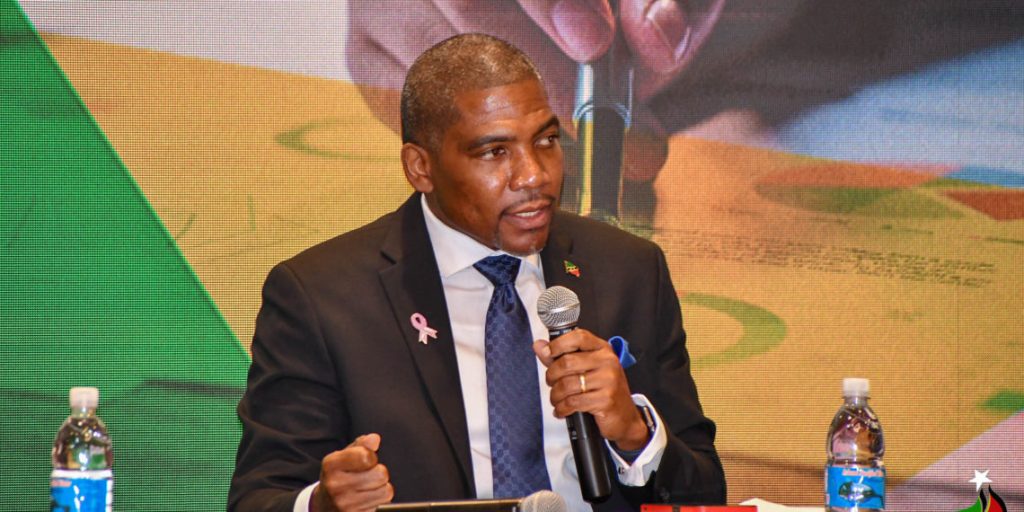Prime Minister Condemns Slander as Separate from Protected Free Speech
Prime Minister Mark Brantley of Nevis, during a recent press conference, vehemently defended the principle of free speech while simultaneously condemning the propagation of slanderous and defamatory statements. He underscored the critical distinction between the constitutionally protected right to express oneself freely and the harmful act of spreading false information with the intent to damage another’s reputation. Brantley emphasized that while he unequivocally supports open dialogue and the free exchange of ideas, such freedoms are not absolute and do not provide a shield for malicious falsehoods. He argued that the dissemination of slander, masquerading as free speech, undermines the very fabric of a democratic society by eroding trust, fostering discord, and potentially inciting violence. This stance, he clarified, is not an attempt to stifle criticism or dissent, but rather a necessary measure to protect individuals from the damaging consequences of unfounded accusations. He urged citizens to exercise their right to free speech responsibly, emphasizing the importance of truthfulness, accuracy, and respect for others’ reputations.
Brantley elaborated on the legal framework surrounding defamation, explaining that it involves the publication of false statements that harm an individual’s reputation. He clarified that the truthfulness of a statement is a key defense against defamation claims, highlighting the importance of verifying information before disseminating it. He further emphasized the potential legal repercussions of spreading false and damaging information, stressing that individuals engaging in such practices can be held accountable in a court of law. This, he argued, underscores the need for responsible public discourse, where opinions are expressed freely but are grounded in factual accuracy and respect for the rights and reputations of others. He reiterated his commitment to upholding the principles of free speech while simultaneously ensuring that the legal system protects individuals from the detrimental effects of defamation.
The Prime Minister’s comments came in response to what he described as a surge in false and misleading narratives circulating within the public domain. He expressed concern over the increasing prevalence of disinformation, particularly through social media platforms, which he argued can be readily exploited for the dissemination of unsubstantiated claims and damaging rumors. This phenomenon, he asserted, poses a significant threat to the integrity of public discourse and the health of democratic processes. He emphasized the need for citizens to be discerning consumers of information, urging them to critically evaluate the sources and credibility of information before accepting it as factual. This, he suggested, requires a heightened awareness of the potential for manipulation and distortion in the digital age, and a commitment to seeking out reliable and verifiable information.
Brantley’s pronouncements reflect a broader global conversation surrounding the balance between free speech and the responsible use of information. The rise of digital platforms and the proliferation of online content have created a complex landscape where information, both accurate and inaccurate, can spread rapidly and widely. This has amplified the potential for harm through the dissemination of false information, highlighting the need for mechanisms to combat disinformation and hold individuals accountable for spreading malicious falsehoods. Internationally, governments and organizations grapple with the challenge of regulating online content without infringing upon fundamental freedoms. The Prime Minister’s remarks underscore the delicate balance between protecting free speech and mitigating the harmful consequences of disinformation.
He further contextualized his position within the framework of responsible governance, arguing that protecting citizens from defamation is an essential function of a democratic government. He asserted that a government’s responsibility extends beyond simply safeguarding freedom of expression, encompassing the protection of individuals’ reputations and dignity from unwarranted attacks. He argued that a society where false and damaging information can be spread with impunity undermines the rule of law and erodes public trust. Therefore, he posited that addressing the issue of defamation is not a restriction of free speech but rather a necessary measure to ensure that the right to free speech is exercised responsibly and does not impinge on the rights and reputations of others. This, he suggested, strengthens the overall fabric of a democratic society by promoting respectful and truthful dialogue.
In closing, Prime Minister Brantley reaffirmed his unwavering commitment to upholding the fundamental principle of free speech, while simultaneously stressing the importance of responsible communication and the legal ramifications of defamation. He reiterated the critical distinction between protected speech and the dissemination of malicious falsehoods, urging citizens to exercise their right to free expression responsibly and with due regard for the truth. He underlined the government’s responsibility to protect individuals from the damaging effects of defamation, highlighting the importance of fostering a climate of respectful and truthful public discourse. His remarks serve as a timely reminder of the complex interplay between free speech, responsible communication, and the need to combat the spread of disinformation in the digital age. He called upon all stakeholders, including citizens, media outlets, and social media platforms, to work collaboratively in promoting accurate and responsible information sharing, ensuring that the right to free speech is exercised ethically and does not become a weapon for the dissemination of harmful falsehoods.
Share this content:












Post Comment